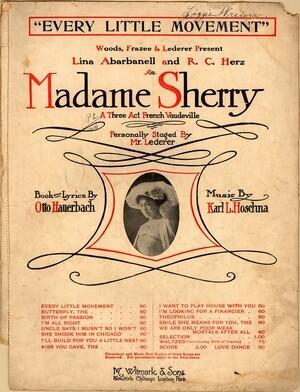Death of singer and casting agent Lina Abarbanell
She made her public debut in Germany at the age of seven. At fifteen, Abarbanell made her debut with the Berlin Court Opera, where she sang the role of Adele in Die Fledermaus over a hundred times. She sang for the royal heads of state in Austria, Bavaria, and Persia.
But it was Lina Abarbanell’s American debut at New York’s Metropolitan Opera in 1905, singing the role of Hänsel in the company’s first staging of Humperdinck’s Hänsel und Gretel, that secured her a new home and venues for her talents in America. She toured the country for the next thirty years, singing her way through forty Viennese-inspired confections such as The Grand Duke, Enter Madame, and The Student Prince. Her face was featured on the sheet music of the popular song “Every Little Movement Has a Meaning All Its Own.”
Following her greatest triumph in the role of Hanna in Lehár’s The Merry Widow, she left performing when her husband died. She embarked instead on a new career as casting director and producer, casting the Broadway hits Street Scene by Elmer Rice and Porgy and Bess.
Lina Abarbanell also received the singular accolade of having her name dropped into the lyrics of a Leonard Bernstein work, Trouble in Tahiti. Abarbanell’s daughter Eva had married the composer Marc Blitzstein, to whom Bernstein dedicated Tahiti. Bernstein, who found Blitzstein’s mother-in-law Abarbanell “very happy, gay, charming, and affectionate,” wrote the following in-joke about her American status into a “scat” section of the chorus:
Skid a lit day. Skid a lit Ada Abarbanell.
Who but Arbarbanell buys a visa.
Abarbanell continued her relationship with Blitzstein even after her daughter’s death in 1936, casting his opera Regina in 1949 and his musical Juno in 1959. And she continued her life in the theatre, the home of her continued fame, until her death in 1963.
Sources: There's a Place for Us: The Musical Theatre Works of Leonard Bernstein, Helen Smith, Ashgate, 2011; Marc Blitzstein: His Life, His Work, His World, Howard Pollack, Oxford University Press, 2012.




